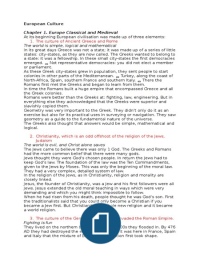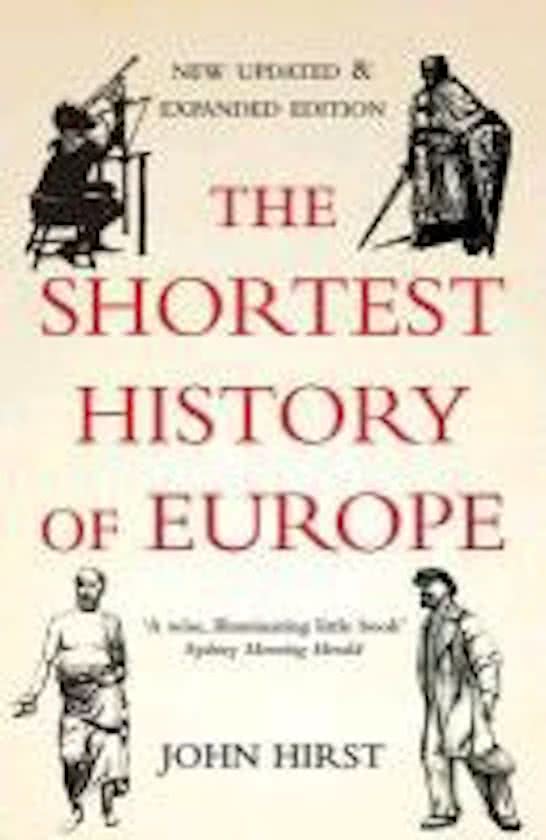European Culture
Chapter 1. Europe Classical and Medieval
At its beginning European civilisation was made up of three elements:
1. The culture of Ancient Greece and Rome
The world is simple, logical and mathematical
In its great days Greece was not a state; it was made up of a series of little
states: city-states, as they are now called. The Greeks wanted to belong to
a state: it was a fellowship. In these small city-states the first democracies
emerged. Not representative democracies: you did not elect a member
or parliament.
As these Greek city-states grew in population, they sent people to start
colonies in other parts of the Mediterranean. Turkey, along the coast of
North-Africa, Spain, southern France and southern Italy. There the
Romans first met the Greeks and began to learn from them.
In time the Romans built a huge empire that encompassed Greece and all
the Greek colonies.
Romans were better than the Greeks at: fighting, law, engineering. But in
everything else they acknowledged that the Greeks were superior and
slavishly copied them.
Geometry was very important to the Greek. They didn’t only do it as an
exercise but also for its practical uses in surveying or navigation. They saw
geometry as a guide to the fundamental nature of the universe.
The Greeks also thought that answers would be simple, mathematical and
logical.
2. Christianity, which is an odd offshoot of the religion of the Jews,
Judaism
The world is evil, and Christ alone saves
The Jews came to believe there was only 1 God. The Greeks and Romans
had the more common belief that there were many gods.
Jews thought they were God’s chosen people. In return the Jews had to
keep God’s law. The foundation of the law was the Ten Commandments,
given to the Jews by Moses. This was only the beginning of the moral law.
They had a very complex, detailed system of law.
In the religion of the Jews, as in Christianity, religion and morality are
closely linked.
Jesus, the founder of Christianity, was a Jew and his first followers were all
Jews. Jesus extended the old moral teaching in ways which were very
demanding and which you might think impossible to follow.
When he had risen from his death, people thought he was God’s son. First
the traditionalists said that you could only become a Christian if you
became a Jew first. But Christianity is a whole new religion and it became
a world religion.
3. The culture of the German warriors who invaded the Roman Empire.
Fighting is fun
They lived on the northern borders and in the 400s they flooded in. By 476
AD they had destroyed the empire in the west. It was here in France, Spain
and Italy that the mixture of European civilisation first took shape.
,The Germans were illiterate and left no written records.
Three elements brought together
First link between the three elements: The Roman Empire becomes
Christian.
In the Roman Empire you could practise your own religion, with this
exception: you had to sacrifice to the emperor. The Romans believed the
emperor was something like a god. Christians wouldn’t do it, they must
worship one god and they would not treat the emperor as in any way a
god. Usually they were excused from honouring the emperor.
An emperor, Constantine, became a Christian or at least gave official
support to the Christian churches. He thought their god might look after
him and the empire better than any other. Fifty years later another
Christian emperor outlawed all other religions. Christianity became the
official and sole religion of the empire.
Second link: The church becomes Roman
Now the church was a complete hierarchy of full-time paid officials: priests,
bishops and archbishops.
The bishop of Rome made himself the pope and governs the church.
Church had its own system of law and its own courts.
When the Roman Empire collapsed, the church survived. The pope was a
parallel figure to the Roman emperor, controlling a hierarchy of officials
beneath him.
Third link: The church preserves Greek and Roman learning
After the Roman Empire collapsed, the church preserved the learning of
Greece and Rome. Amazing development because: all the writers,
philosophers and scientists of ancient Greece and Rome were pagan, not
Christian.
Why would the Christian church bother witch such people? The
Christians did not set up their own system of education, so it relied on
educated people who were steeped in the Greco-Roman tradition. They
used Greek philosophy and Greek logic to explain and defend Christianity.
These Christian scholars thought of the great philosophers and moralists of
Greece and Rome as possessing some of the truth, although Christianity
was of course the full truth. But the Greek philosophers could be used
as a guide to the truth and to argue about the truth. Although there
were pagan, the church preserved and used their writings.
Fourth and last link: German warriors support Christianity
The Germans did not intend to destroy the Roman Empire when they
invaded it. They were coming for: plunder, to get the best lands and to
settle down and enjoy the good things in life.
But the trouble was that in the 400s so many Germans came, and took so
much land, there was nothing left for the emperor to control. Roman
Empire came to an end because there was nothing left to rule.
,The Germans found that they had to run the societies they had invaded.
They were illiterate Roman administration collapsed Trade and towns
shrank.
The warrior chiefs set themselves up as kings and created little kingdoms.
Kingdoms rose and fell rapidly.
Governments in these circumstances were extremely weak; they weren’t
even able to collect taxation.
The German warrior now turned himself into a king and allotted land to his
companions, who were turning themselves into the nobility, on the
condition that when the king needed an army the nobles would provide it
for him.
There was a long fight for kings to get more power: to be able to rule
without being in the hands of the nobles; to get their own system of
taxation; to have an army that they fully controlled; to get their own
bureaucracy.
Private property became sacrosanct; the nobles had turned land held on
condition into private property. This always put a limitation on
governments.
European governments, even when called ‘absolute’, could never act like
that: ‘’not everything is the king’s’’.
The notion that government must be limited arose because at the
beginning government in fact was extremely limited. Also important for
economic development.
Soon after invading the empire, the warriors became Christian. The
church was the only institution, which survived the collapse of the Roman
Empire.
Quite quickly the bishops were able to persuade the warriors that they
would kill more of their enemies if they accepted the Christian god.
They accepted the religion of the people they had conquered.
Conclusion:
German warriors support Roman Christian church, which preserves Greek
& Roman learning.
This odd mixture held together for about thousand years: from around 476
AD (date of the fall of the Roman Empire) to about 1400. The Middle
Ages or medieval period.
The 3 eras of the European history: ancient or classical, medieval, modern.
Throughout the Middle Ages this odd trio holds together, but the elements
do change.
Warriors becoming Christian knights:
The early Christians refused military service, one reason why the Romans
were suspicious of them. But now the Christians are in partnership with
German warriors. Once Christianity had been taken up by Constantine
and become an official religion it had to change its views about violence.
Governments must fight.
Yet when the church teamed up with these warriors it did not accept their
values. Warrior changed into the knight.
, A knight loved fighting, but fought for good reasons. The church
encouraged him to fight non-Christians.
A knight also protected the weak, especially high-born women. The
attitude of protecting and honouring ladies was long lasting in European
culture. After knight’s disappeared, attitude of the ‘gentlemen’.
Feminists in recent times fought against this respect. They wanted to be
equal.
Greek and Roman learning supporting Christianity:
They have only survived because the church copied and re-copied them
right through the Middle Ages.
The church borrowed what they wanted, reassembled the bits it had taken,
put them with passages from the Bible and so constructed a Christian
theology. So Greek philosophy, Greek learning and Greek logic were all
pressed into service in support of Christianity.
German warriors become Christian knights, Greek and Roman learning
support Christian doctrine Christendom
After the year 1400 this strange alliance begins to break apart and modern
times begin.
Chapter 2. Europe Modern
Around 1400 the mixture began to come apart. This occurred first in the
Renaissance.
The Renaissance is often depicted as the discovery or rediscovery of Greek
and Roman learning. But it wasn’t so much that the learning had been lost
and had to be rediscovered, though some new discoveries were made at
this time.
Instead of the church using ancient learning to support its theology, now
there were scholars who were interested in imagining the Greek and
Roman world as it existed when the learning was produced.
It was a more ‘wordly’ world. It was a very open-minded world, which the
Renaissance scholars now entered.
However, the scholars of the Renaissance did not directly attack
Christianity. They took a view of the Christian religion, which was similar to
the ancients’ view of religion. Religion was not to control all of life and
thought, which had been the church’s aim. Once that control had been
broken, European thought became more adventurous.
With the Renaissance begins the long process of the secularisation of
European society. A secular world is one in which religion might exist, but
it exists as private business or as an association of people who are
attached to certain beliefs. Religion doesn’t dominate society.
What happened in the Renaissance: people of one culture and tradition
thought themselves into another culture and tradition.
The men of the Renaissance were the first to call the age of Greece and
Rome the classical era. Classic here means the very best.
The Renaissance disrupted the mixture with the message: The classics are
supreme.






